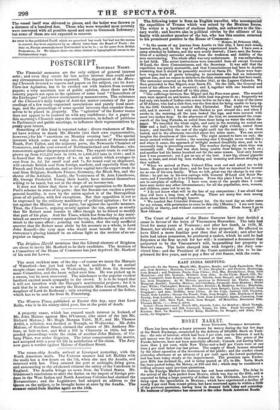POSTSCRIPT.
SATURDAY NIGHT.
The Financial measures are the only subject of general interest astir ; and even they create far less active interest than could under any circumstances have been expected. The department of the Morn- ing Chronicle devoted to reports and papers on the subject, vice its Anti- Corn-law Agitation, has to be swelled out with leaders from country Papers; a very uncertain test of public opinion, since there are few country papers not open to the opinions of some local "Chancellors of the Exchequer" and clever electioneering manteuverers. The substance of the Chronicle's daily budget of Anti-tax matter consists of the pro- ceedings of a few ready-organized associations and purely local meet- ings, and the proceedings of some special interests that consider them- selves to be placed in jeopardy. The "agitation" of the Easter recess does not appear to be counted on with any confidence ; for a paper in this morning's Chronicle urges the constituencies, in default of petitions to Parliament and public meetings, to influence their representatives by perkily-post letters.
Something of this kind is reported today : divers tradesmen of Bris- tol have written to thank Mr. Blewitt (not their own representative, however,) for his "exertions on Monday evening last." The special interests which come out today are, the coal-owners of Swansea and Neath, Port Talbot, and the adjacent ports, the Newcastle Chamber of Commerce, and the coal-owners of Northumberland and Durham ; who remonstrate against the proposed coal-tax. The export-trade in coal has grown up from 615,255 tons in 1834, to 1,606,313 tons in 1840; and it is feared that the export-duty of 4s. on an article which averages in cost from 3s. 6d. for small coal and 7s. for round coal on shipboard, will exclude British coal from foreign markets, and especially from the French and Dutch markets, and so drive capital into the export-trade in coal from Belgium, Southern France, Germany, the Black Sea, and the shores of the Adriatic. Lastly, the Vestrymen of St. Ann Limehouse, Mr. George Frederick Young their leader, have declared themselves willing to be taxed, but not in the shape of an income-tax. It does not follow that there is no general opposition to Sir Robert Peel's scheme in some of its parts: that the Income-tax excites a pretty general hostility, is seen by the union against it of the Metropolitan press of all parties, with few exceptions. But that opposition is not to be expressed by the ordinary machinery of political agitation ; for it is not against the Minister, or his party, but against the specific measure. Thus, the Chronicle, arguing stoutly against the tax, argues as stoutly that Sir Robert must remain in office though he be forced to modify that part of his plan. And the Times, which has from day to day main- tained an unswerving contest against the tax, has this morning an article much to the same effect ; pointing out besides, that the only unofficial asserter that Sir Robert must abide by his measure as a whole, is Lord John Russell—the very man who would most benefit by the rival statesman's placing himself in an odious light as the reviver of so un- popular an impost.


























 Previous page
Previous page